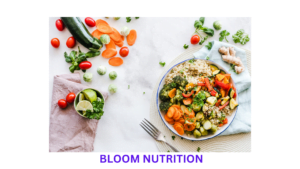In the dynamic field of wellness, where trends come and go, Bloom Nutrition stands out as an icon of holistic health. This innovative approach to nutrition goes beyond traditional paradigms, focusing not only on physical well-being but also on nourishing the mind and spirit. Let’s dive into the essence of Bloom Nutrition and how it can transform your overall health.



A Symphony of Nutrients:
At the core of Bloom Nutrition is a commitment to providing a diverse range of nutrients essential for optimal functioning. From vitamins and minerals to antioxidants and phytochemicals, the emphasis is on creating a symphony of nutrition that supports every aspect of your health.
Whole-Food Embrace:
Unlike fad diets, which often prioritize restriction, Bloom Nutrition supports the consumption of whole foods. By emphasizing the importance of unprocessed, nutrient-rich foods, it promotes a sustainable and balanced approach to eating. This philosophy believes that true nutrition comes from the inherent goodness of whole, natural ingredients.
Mindful Eating Practices:
Beyond the plate, Bloom Nutrition encourages mindful eating practices. Taking time to savor each bite, being present during the meal, and cultivating awareness of hunger and satiety are integral components. This holistic approach acknowledges the connection between mental well-being and nutrition, promoting a healthy relationship with food.
Adaptogens and Stress Management:
Bloom Nutrition recognizes the impact of stress on overall health and contains adaptogens—natural substances known for their stress-relieving properties. By addressing the mind-body connection, this nutrition philosophy goes beyond simply fueling the body to actively support stress management and mental resiliency.
Spiritual nourishment:
The spiritual aspect of Bloom Nutrition extends beyond the physical and mental, to the realm of emotional and spiritual well-being. It encourages individuals to explore their unique nutritional needs, promotes a sense of connection with the food they consume and has an impact on their overall vitality.
Environmentally Conscious Approach:
In a world increasingly conscious of environmental sustainability, Bloom Nutrition aligns with environmentally conscious values. It promotes ethical sourcing, sustainable agricultural practices and conscious consumption, believing that the health of individuals is inseparable from the health of the planet. Community and Support:
Bloom Nutrition is not just a lonely journey; It thrives on community and support. Whether through online forums, local meetings or educational resources, individuals following Bloom Nutrition find a network that shares insights, recipes and encouragement, creating a sense of camaraderie in the pursuit of wellness. conclusion:
Bloom Nutrition goes beyond traditional dietary approaches, weaving a web of nutrition that engages body, mind and spirit. By embracing whole foods, incorporating mindful practices, and fostering a sense of community, it empowers individuals to begin the journey toward holistic health. As we navigate the intricacies of modern life, Bloom Nutrition stands as a guiding light, reminding us that true well-being is a harmonious blend of nutrition, mindfulness, and spiritual life.
here is some video tutorial.
How to nurture bloom
Bloom Nutrition is a holistic approach to nourishing your body, mind and spirit. Here are some key principles to incorporate into your lifestyle: Add variety to your plate: Include a variety of nutrient-rich foods in your diet. Aim for a colorful range of fruits, vegetables, whole grains, lean proteins and healthy fats. This ensures that you get a broad spectrum of vitamins, minerals and antioxidants. Give priority to whole foods:
opt for minimally processed, whole foods instead of packaged or refined options. Whole foods retain their natural goodness and provide essential nutrients without added preservatives or artificial ingredients. Eating mindfully:
Practice eating mindfully by savoring each bite, paying attention to hunger and fullness cues, and being present during meals. Avoid distractions like phones or screens to create a deeper connection with your food. Adaptogens include:
Explore adaptogenic herbs and plants known for their stress-relieving properties. Adaptogens, like ashwagandha or rhodiola, can support your body’s response to stress, promoting balance and flexibility.
Hydrate Consciously:
Hydration is important for overall health and can affect energy levels, digestion and cognitive function. Write an article on balanced nutrition. Balanced nutrition is the cornerstone of a healthy lifestyle, providing the essential nutrients our bodies need to function optimally. This goes beyond simply counting calories and involves a thoughtful selection of a variety of foods to ensure a good intake of proteins, carbohydrates, fats, vitamins and minerals.
Importance of balance:
A balanced diet is essential for maintaining a healthy weight, supporting organ function, and preventing various health problems. Each nutrient plays a unique role in the body, and imbalances can lead to deficiencies or excesses, which affects overall well-being.
Components of a balanced diet:
Protein: Protein is important for building and repairing tissues. Include sources like lean meat, fish, eggs, dairy products, legumes and nuts in your diet.
Carbohydrates:
Carbohydrates are the body’s primary energy source. opt for complex carbohydrates, found in whole grains, fruits and vegetables, while controlling refined sugars. Fat: Healthy fats aid brain function and hormone production. Include sources like avocado, nuts, seeds and olive oil while limiting saturated and trans fats.
vitamins and minerals:
A colorful array of fruits and vegetables provide a spectrum of vitamins and minerals essential for various bodily functions. Make sure to have a diverse selection for maximum profits. Fiber: Fiber found in whole grains, fruits and vegetables aids digestion and helps keep the gut healthy. It also contributes to the feeling of satiety, aiding weight management.
Adaptation to individual needs:
Each person is unique, and nutritional needs may vary depending on factors such as age, gender, activity level and health conditions. Consulting a health care professional or registered dietitian can help design a balanced diet tailored to individual needs. Practical tips for balancing nutrition: portion control: Watch portion sizes to avoid overeating. meal plan:
Plan meals in advance to ensure a varied and balanced intake. Include a mix of food groups for comprehensive nutrition. Hydration: Adequate water intake is important for overall health. To stay hydrated, replace sugary beverages with water and herbal teas. Limit processed foods: conclusion: Achieving balanced nutrition is a holistic approach to health and well-being. By including a variety of nutrient-rich foods in appropriate proportions, individuals can help their bodies function better. It’s not about a strict diet, but about making informed and sustainable choices that contribute to long-term health and vitality. Adopting a balanced nutrition empowers individuals to take responsibility for their own well-being and enjoy the benefits of a healthier, more energetic life.

